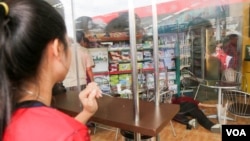U.S. oil giant Chevron has clashed with the former opposition leader of Cambodia over a request to release footage of the murder of prominent political analyst Kem Ley at one of its gas stations in Phnom Penh last year, court documents reveal.
Chevron is seeking to quash a request from Rainsy that would force it to release footage from its local subsidiary in Cambodia, Caltex, where Ley was shot dead on July 10. The company claims the tapes were removed from the site by Cambodian authorities immediately after the incident.
The case is due to be heard on June 8.
Eva Schueller, a lawyer for Rainsy, urged Chevron to meet its corporate social responsibility commitments by releasing the footage.
“Prompt release of the requested, limited discovery sought in this application would demonstrate that it takes its corporate responsibility seriously,” she said in the petition to the court. “And that those commitments are more than just empty public relations rhetoric.”
Schueller also accused Chevron of using a rule that is normally reserved for cases where it is seeking to obtain evidence to serve its own business interests to “conceal” the evidence in this case.
“The irony, of course, is that Chevron, more than any other company in the world, has repeatedly used 1782 to obtain the very type of evidence it is trying to conceal here,” Schueller wrote in the petition, filed on May 4.
Rainsy had sought the security camera footage from the site to use as evidence for his defense in a defamation case filed against him by Prime Minister Hun Sen. Rainsy claimed on Facebook that Hun Sen was responsible for Ley’s murder.
Chevron has called the proceedings “pointless” and accusations in the petition “baseless” and called for the petition to be thrown out.
It claims the hard copies of the recordings were removed from the gas station and that no digital copies of the files were stored by the company.
It said Caltex employees at the gas station did not have company email accounts, access to a network linked to Chevron or possess company-issued devices.
“Applicants were no doubt disappointed that Chevron could not supply the video recording and that the service station employees could not have communicated on a company network,” said William Thomson, Chevron’s lead defense attorney, in a petition to the court on May 11.
“But rather than embrace a reasonable resolution, applicants escalated their demands and began insisting that Chevron – now – conduct an on-the-ground investigation of events occurring nearly a year a go and 8,000 miles away”.
“This new demand – not found in the original petition – coupled with applicants’ threats to pursue unending additional discovery, left Chevron with no choice but to file its motion to quash. ”
Rainsy is now living in exile in France. A Phnom Penh court has sentenced him to 20 months in jail and a fine of $2,500. The court also sentenced Oeut Ang to life behind bars for the killing of Kem Ley.
But Ley’s family said the trial was a show and even Ang’s family said they don’t believe he was the sole killer.








